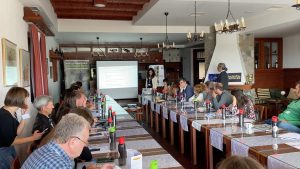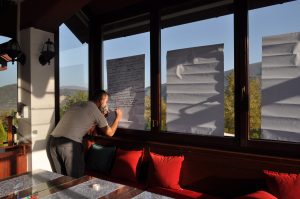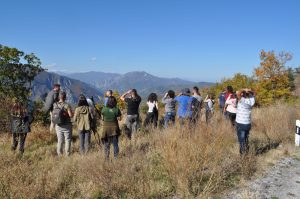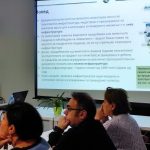 At the end of October 2022 we provided logistical support and ensured that representatives from the relevant institutions participated on the Regional Workshop on Mobile Pastoralism and Vultures alongside relevant stakeholders. The workshop took place in Popova Kula, Demir Kapija. The 3-day event was collaboratively organized by Yolda Initiative, Vulture Conservation Foundation, EuroNatur and the Macedonian Ecological Society, with the funding provided by the MAVA Foundation and from the LIFE Programme of the European Union within the framework of the BalkanDetox LIFE project. In total, 32 individuals from 11 different countries participated.
At the end of October 2022 we provided logistical support and ensured that representatives from the relevant institutions participated on the Regional Workshop on Mobile Pastoralism and Vultures alongside relevant stakeholders. The workshop took place in Popova Kula, Demir Kapija. The 3-day event was collaboratively organized by Yolda Initiative, Vulture Conservation Foundation, EuroNatur and the Macedonian Ecological Society, with the funding provided by the MAVA Foundation and from the LIFE Programme of the European Union within the framework of the BalkanDetox LIFE project. In total, 32 individuals from 11 different countries participated.
Meeting Goal:
- Provide the base and beginning of a Balkan network between mobile pastoralists, vulture conservationists and conservation authorities.
During the first day of the workshop, following the welcoming speeches given by the main organizers, the meeting began with presentations from Yolda Initiative describing the regional-level situation regarding mobile pastoralism in Europe as well at the responses by local associations and governments. Shortly after, livestock keepers and experts on the subject gave individual presentations on the current situation in the Balkans. The second half of the day comprised of two rotational working groups that identified the key issues with mobile pastoralism. Livestock keepers provided important insight on consistent problems that they face. These issues were then categorized from least to most urgent to solve, together with the conservationists.
- Policy issues
- The existing economic model
- Infrastructure issues
- Societal values
 The second day focused more on the relevant policy and legal frameworks that are applicable for traditional mobile pastoralists. Vyara Stefanova gave insight on international policies as well as the EU common agricultural policy (CAP), and discussions ensued on the pros and cons of this policy with various opinions stated. The implementation of EU sanitary regulations was also covered. Esmeralda Laci then gave a presentation concerning the ongoing process of Albania’s case of having traditional mobile shepherding be recognized and proclaimed as an intangible cultural heritage by UNESCO.
The second day focused more on the relevant policy and legal frameworks that are applicable for traditional mobile pastoralists. Vyara Stefanova gave insight on international policies as well as the EU common agricultural policy (CAP), and discussions ensued on the pros and cons of this policy with various opinions stated. The implementation of EU sanitary regulations was also covered. Esmeralda Laci then gave a presentation concerning the ongoing process of Albania’s case of having traditional mobile shepherding be recognized and proclaimed as an intangible cultural heritage by UNESCO.
Following these speeches, the focus shifted toward vultures and the species conservation in the region with an overview of the BalkanDETOX Life project. Vulture feeding sites were discussed and how these could be connected to incorporating the role of mobile pastoralists in vulture conservation. The topic of quality guard dogs as solutions to predator attacks to mitigate livestock keepers’ incentive to leave poisoned carcasses was covered with a real life project example in North Macedonia, presented by the professor Vladimir Dzabirski. Dimitrios Vavylis from the Hellenic Ornithological Society briefly introduced their work as a professional poison dog handler and the potential for investment in such activities. They also briefly spoke on the use of electric fences/fladry as a solution against predator attacks and the success of these methods.
Policy issues were divided between legal, financial and operational topics of discussion and development. Concerning legal matters, specific legislations and regulations (such as forestry) should be adapted to benefit grasslands and small livestock breeders. There should also be a simplification of bureaucratic procedures and support regarding applying for subsidies, compensation measures, etc… Ministries of Agriculture, Culture and Environment would be mainly involved in this aspect. In regards to the financial aspect, sufficient subsidies in EU/non-EU countries should be provided as well as specific financial programmes that would support traditional pastoralist products should be more developed. Additionally, better branding and trade should be supported of traditionally produced products. In terms of operational issues, better organization of pastoralist cooperatives would be beneficial. Actions and solutions suggested were:
- More research, data collection, and publications concerning the topic
- Simplified protocols for applying for subsidies and financial support
- Promotion of mobile pastoralism as a touristic offer
- Defining certification and labelling system
- FAO, UNESCO/International Policy lobbying for the benefit of small scale livestock breeders/traditional pastoralists
- Identify ambassadors for transhumance
- Protecting and conserving existing water points as well as maintaining existing routes
- Access to basic services (heating, electricity, water)
The third day was a field-excursion to the vulture feeding station on Vitachevo. We were accompanied by Emmanuel Lisicanec, a local from the town Kavadarci that regularly works on projects concerning vulture and general bird protection in North Macedonia. Lisicanec also helps in maintaining the vulture feeding station on Vitachevo, by supplying food and monitoring of the station. After scanning the area for some time, a few sharp-eyed participants were able to catch a glimpse of a Griffon vulture flying nearby the station.



